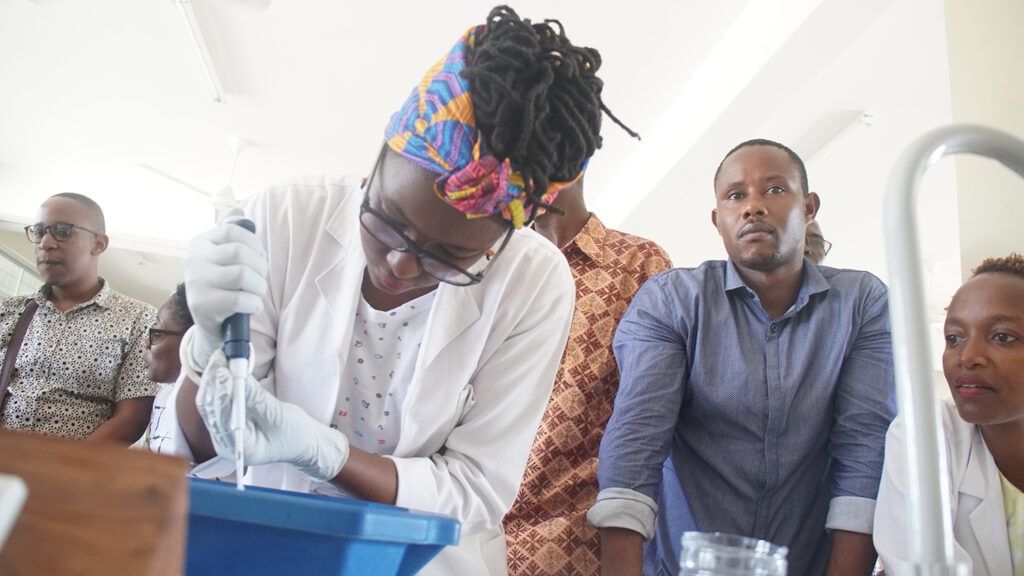The agrobiologicals sector in Eastern Africa is becoming stronger and better organised, partly thanks to efforts by SIANI’s expert group Agrobiologicals in East Africa. As the group is now concluding its work, the collaboration will continue in new forms. Learn more about the next steps to advance the use and production of agrobiologicals.
The SIANI expert group on agrobiologicals was established in 2024 to promote biobased fertilisers, stimulants and pesticides, developed from for example compost and insects rather than chemicals. Previous research has shown that these types of products can boost the productivity of smallholder farms but are not yet widely used in Sub-Saharan Africa. The expert group wants to pave the way for wider uptake, building on insights from projects like AgriFoSe2030, which have shown that farmers often lack access to agrobiological inputs and that current regulations present obstacles.
The Agrobiologicals in East Africa expert group has been active in Ethiopia, Kenya and Tanzania, with a national working group in each country. On 20 May, the expert group held a webinar with presentations of results from each working group and discussions about what needs to happen next.
Kenya: Production is picking up
Kenya is often seen as an agrobiological frontrunner and the working group’s coordinators Allan Mueke (Mount Kenya University) and Cecilia Onyango (University of Nairobi) are optimistic about the future. In December 2024, Kenya boasted over 150 registered products and more than 30 companies manufacturing or selling different forms of agrobiological outputs.
Yet challenges remain, as made clear in Dr Mueke’s presentation. Though agrobiologicals are acknowledged, there is no comprehensive regulation of the sector, which means that relevant laws and regulations are not always aligned. The coordinators see this as an area that will require more attention.
Tanzania: Agrobiologicals actors joining forces
Agrobiologicals are not well known in Tanzania, according to the working group’s coordinators Aneth David and Mesia Ilomo (both from University of Dar es Salaam). Pockets of interest exist, but the agrobiologicals enthusiasts have so far often worked in isolation. The first activity of the working group in Tanzania was therefore to map stakeholders and invite them to a workshop where the Tanzania Agrobiologicals Stakeholder Network was formed.
Through the network, it is now possible to assess to what extent agrobiologicals are used and to raise awareness among farmers as well as policymakers. Dr David and Dr Ilomo stressed that agrobiologicals must be more clearly regulated, and that there is a need for more research. Typically, it is more difficult to demonstrate evidence for agrobiologicals than for chemicals since the results are more influenced by the local climate.
Moving forward, the Tanzanian coordinators saw a need to focus on four areas:
- Maintaining a strong network of local actors.
- Intensifying awareness raising and capacity-building among farmers.
- Developing a dialogue with policymakers on appropriate regulations.
- Building a knowledge base on the effectiveness of different agrobiologicals.
Ethiopia: Efforts to build local production
Agrobiologicals could play an important role for Ethiopian smallholders, but this would require local production, said the country’s working group coordinator Tewodros Mulugeta (Kotebe University of Education, Ethiopia). Importing agrobiologicals is often too costly and it is difficult to transport and store these easily perishable products. Research indicates that Ethiopia has the potential to instead produce its own agrobiological inputs and a few manufacturers have sprung up.
Yet for the agrobiologicals sector to grow, a number of obstacles must be overcome, according to Dr Mulugeta.
- There is not enough research and development.
- Current legislation favours agrobiological imports over local production.
- Agrobiological products are relatively unknown and difficult to access.
- Regulations are yet to be adapted to the sector.
These challenges could be overcome through a concerted effort combining policy reform, infrastructure development and investments in research. An encouraging sign is the number of model farmers exploring how to produce food without conventional input and their willingness to share their insights with others.
Next steps in advancing agrobiologicals
The webinar participants were invited to submit their own reflections through an online Mentimeter poll. Many highlighted the need for capacity development so that more farmers become aware of agrobiologicals as a safe and effective alternative. This can be done through demonstrations and sharing of real-life experiences. More research is also needed to enhance the scientific understanding of biobased products. Policymakers could do their bit by lowering registration costs for agrobiologicals, creating market incentives and ensuring that laws and regulations are adapted to agrobiologicals.
New projects and collaborations
Many of the prescribed activities could be carried out as part of two new projects of the Swedish University of Agricultural Sciences, which were presented by the project coordinator Anna Maňourová. AgBio4SSA aims to raise the status of agrobiologicals and study how they can be adapted to the needs of smallholder farmers in Sub-Saharan Africa. The sister project inSALSA will try to enhance the uptake of these products as well as the scientific understanding of agrobiologicals under local climate conditions. To ensure that the use of agrobiologicals becomes more evidence-based, inSALSA also includes field tests.
Co-creation will be at the core of both projects, with an aim to be as interactive and engaging as possible, explained Anna Maňourová:
“We plan to hold workshops that are open to different stakeholders and to target the communication to different audiences in different countries.”
Cecilia Onyango stressed the importance of involving regulators from the start: “What we have seen is that you can do very good science but when we are going to communicate the results at the end, we sometimes don’t have the language to communicate so that regulators can understand.”
Building on the expert group experience, Tewodros Mulugeta encouraged more exchanges between different countries:
“We in Ethiopia can definitely learn from Kenya and Tanzania, but when we do that, we should do it through involvement of stakeholders.”
